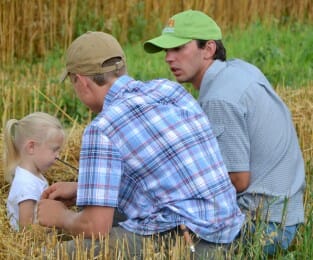Member Spotlight — Robert Alexander, of Granville
Throughout Practical Farmers’ 2017 field day season, we are spotlighting many of the PFI farmers who are graciously giving their time to share their knowledge at these events, as well as members who make the journey to attend them.
Watch practicalfarmers.org and “Practical News,” our weekly email newsletter, for details and updates!

Robert Alexander (right)
360 Heritage Farms
Member since 2015
Granville, IA
Robert (right) and his daughter, Adalynn, crouch in some oat stubble with a red clover underseeding at Scott Ausborn’s recent field day near Ida Grove.
Robert and his wife, April, operate 360 Heritage Farms near Granville, in Sioux County. The 160-acre farm features row crops, hay, a flock of 30 hair sheep (a new addition) and a herd of 40 grass-fed Angus-cross and Belted Galloway cattle. Calves are grass-finished alongside cows, and the herd is raised without hormones or antibiotics.
The whole farm is in transition to organic, though corn was certified organic this year. Robert and April grow their own hay to feed their cow-calf pairs and to sell. “One of the big things we do is sell small, square alfalfa bales,” Robert explains.
Starting to Farm
Robert grew up on his family’s farm, Alexander Farms, located in nearby Remsen. When he decided he wanted to pursue farming as a career, he says selling hay is how he got his start. He had been living in Des Moines, going to school and working, and decided to return home in the spring of 2008.
“I needed to make a car payment when I first moved back from the city,” Robert says. “We had some extra hay, so I took it to auction and started from there. We always had livestock on the farm and had always been putting up hay for our own animals, so it wasn’t anything new to me.”
“We started putting out 500 to 600 small square bales a year,” he continues. “Now, we generally put up 6,000 to 8,000 bales a year. Last year, we put up 6,500 alfalfa bales and almost another 2,000 bedding bales.”
Starting a Family
Robert and April met in Orange City, where Robert worked for a time after he returned home. They got married in 2011 and decided to see how they could make it work to farm full-time.
“We both had had enough of the eight-to-five job setting, so we both quit our jobs and started figuring out how to make farming work by doing odd stuff on the farm,” Robert says.
“April had worked with horses, and so she trained horses for a while. She would buy and sell unbroken training horses. We eventually bought our own acreage in 2012.”
The couple now have three children, which occupy April’s time, so she’s not currently working with horses – though the family still keeps their own.
The oldest child, 4-year-old Adalynn (pictured in the photo), joined her father to attend the recent field day hosted by Scott Ausborn and his family on July 11, near Ida Grove, which explored the topic of transitioning to organic crop farming.
Farm Values
Farming organically is important to the family – and the Alexanders’ farm name encapsulates some of the reasons why.
“360 Heritage Farms is our unofficial farm name, since we haven’t done the paperwork on it – but it has meaning behind it,” Robert explains. “Basically, 360 is a complete circle. It’s back to farming the way grandpa and great-grandpa used to, because the farm will be a Century Farm in 2020. The heritage part is getting back to the way they used to farm.”
Robert’s mother lives on the home place in Remsen; Alexander Farms, where Robert grew up, was her dad’s farm. He says she helps out quite a bit with farm work. Caring for three children, April doesn’t help quite as much as she used to, but when she had more time, Robert says “she was one that would be helping stack the racks when we got started [farming].”
The Future
For right now, the Alexanders are where they want to be with their farm size and scope. They recently added sheep, looking ahead to when their farm attains organic certification.
“We have 30 head of ewes. We’ve thought about reducing some of the calves we finish and replacing those with sheep, and then grazing some acres with sheep when we get into organic rotation on the whole farm,” Robert says.
“If it all works out, we’re thinking around 100 to 150 sheep, depending on what the acres allow. We’d sell them as meat.”
As Robert worked to build the family’s farm, he also started getting involved with Practical Farmers of Iowa, joining in 2015. The following year, in 2016, he conducted an on-farm research project with Practical Farmers exploring the practice of interseeding cover crops into corn. Learn more about that research project here.
